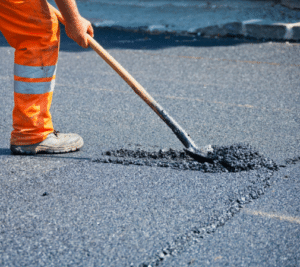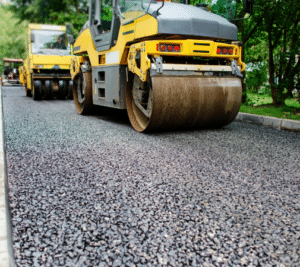What Is Asphalt Repair?
Asphalt is a durable and long-lasting material used in constructing roadways, parking lots, and driveways. However, over time, it can develop cracks, potholes, and other types of damage due to factors like heavy traffic, weather conditions, and wear and tear.
Asphalt repair is the process of fixing and restoring damaged asphalt surfaces to their original condition. This involves identifying and addressing the underlying issues that caused the damage, preparing the damaged area for repair, and applying repair materials to fill the cracks or holes.
Several types of asphalt repair techniques are available, depending on the extent and severity of the damage. Cold asphalt patching and crack filling are commonly used for minor cracks and holes. These methods involve filling the damaged areas with a ready-made mixture of asphalt and other materials that can be easily applied.
For more significant damage, hot mix asphalt repair may be necessary. Hot mix asphalt is a combination of heated asphalt cement and aggregate, which is applied to the damaged area after it has been cleaned and prepared. Once the hot mix is applied, it is compacted and allowed to cool, creating a seamless repair.
In addition to repairing damaged areas, regular asphalt maintenance can also help prevent future damage and extend the life of the asphalt surface. This includes sealcoating, which involves applying a protective coat to the asphalt surface to protect against weather damage, oil stains, and other types of wear and tear.
Overall, asphalt repair is critical to ensure the safety and longevity of our roadways, parking lots, and driveways. By identifying and addressing issues early on, we can avoid more costly repairs and help maintain the quality and integrity of our asphalt surfaces for years.
Types of Asphalt Surfaces
Asphalt is popular for many surfaces thanks to its durability, affordability, and versatility. Several types of asphalt surfaces are available, each with unique properties and ideal applications.
One of the most common types of asphalt surfaces is the asphalt driveway. This surface is typically made from a base layer of compacted gravel, followed by several hot mix asphalt layers. The result is a smooth, durable surface that can withstand heavy loads and frequent use.
Another popular application of asphalt is for parking lots. These surfaces are designed to accommodate heavy loads, regular traffic, and wear and tear. They can be constructed using several hot mix asphalt layers, a sturdy base layer, and proper drainage to prevent water damage.
Asphalt overlays are another type of asphalt surface commonly used to repair and extend the life of existing asphalt surfaces. This technique involves adding a layer of hot mix asphalt on top of a damaged or worn surface, creating a fresh new top layer that is both functional and aesthetically pleasing.
Porous asphalt may be the best option for areas with heavy foot traffic, such as sidewalks, bike paths, and recreational areas. This specially designed type of asphalt allows water to filter through the surface and into the ground below, reducing the risk of flooding and erosion.
Finally, there are cold asphalt surfaces, which are ideal for more minor repairs and patching jobs. Cold mix asphalt mixtures are typically used for repairing cracks and potholes and can be applied quickly and easily without heating equipment or special tools.
No matter what type of asphalt surface you need, plenty of options are available to suit your needs and budget. An asphalt surface can provide years of dependable service with proper installation and regular maintenance.
Benefits of Preparing The Surface for Asphalt Repair
Asphalt repair and maintenance are critical aspects of keeping your pavement in excellent condition. However, did you know that preparing the surface before any repair is necessary for its success and longevity?
There are several benefits to preparing the surface before asphalt repair. One of the most significant advantages is that it ensures that the repair materials adhere to the pavement. If the surface is not adequately cleaned and prepped, the repair materials may not bond correctly, leading to a failed repair and potential safety hazards.
Preparing the surface for asphalt repair also helps identify underlying issues with the pavement that may need more attention. For instance, if there are significant cracks or potholes, repairing them is only a temporary solution. These underlying issues may require a more extensive repair process, so inspecting and preparing the surface is critical.
Another crucial benefit of preparing the surface before any repair work is preventing water damage. Water infiltration can cause significant damage to an unprepared surface, leading to more severe cracks or potholes. Preparing the surface ensures adequate drainage and improves its ability to withstand wear and tear, thus preventing future problems.
Furthermore, preparing the surface enables the repair contractor to use the correct repair materials for the job. Different types of damage require different types of repair materials, and an adequately prepared surface will allow for the appropriate materials to be used, improving the quality and longevity of the repair work done.
To conclude, preparing the surface before any asphalt repair work is a necessary step that should not be overlooked. It ensures the longevity and effectiveness of repair work, helps identify underlying issues, prevents water damage, and allows for appropriate repair materials. It’s critical to work with a reputable and experienced asphalt contractor who understands the importance of preparation and pays attention to every detail of the repair process.
Preparing the Surface for Asphalt Repair
Asphalt surfaces are commonly used for pavements and driveways due to their durability and affordability. However, like all structures, they may eventually succumb to wear and weathering. When this happens, you may need to invest in asphalt repair to prevent further damage and keep the surface in good condition. However, before you start the repair process, preparing the surface adequately is vital.
The preparation process may involve various actions ranging from cleaning to inspection, aiming to ensure the repair work is successful. The first step in preparing the surface for asphalt repair is cleaning it thoroughly. The surface should be free from debris, dirt, and oils that may interfere with the bond between the new asphalt and the existing surface. A pressure washer is handy for this task, allowing you to clean even the most stubborn stains.
After cleaning, the next step is inspection. A thorough inspection helps identify any underlying issues that may require more attention. For instance, significant cracks or potholes may not be fixed through ordinary repair methods. Identifying these underlying problems early on ensures that they are addressed before proceeding with the asphalt repair, leading to a more successful restoration in the long term.
The next step is to ensure proper drainage. An adequately prepared surface should have adequate drainage that prevents water infiltration. Water infiltration is one of the main causes of damage to asphalt surfaces, leading to cracks and potholes. Therefore, ensuring adequate drainage before proceeding with the repair is crucial in preventing future damage.
Proper preparation also ensures that suitable repair materials are used for the job. Different types of damage require different repair materials, and an adequately prepared surface will allow the repair contractor to use the proper materials for the job. Using the right materials leads to better-quality repairs and a longer lifespan for the repaired surface.
In conclusion, preparing the surface before asphalt repair is crucial in ensuring a successful repair process. It improves the adhesion between the new asphalt and the existing surface, identifies underlying problems, and prevents future damage. With the proper preparation, you can prolong the life of your asphalt surface, save money and ensure safety for those using it.
Don’t wait any longer to get your asphalt looking like new. Get in touch with Saguaro Asphalt today and let our experienced team take care of all your asphalt repair needs. Contact us now for a free consultation and find out how we can help you achieve the best results for your asphalt repair project.



